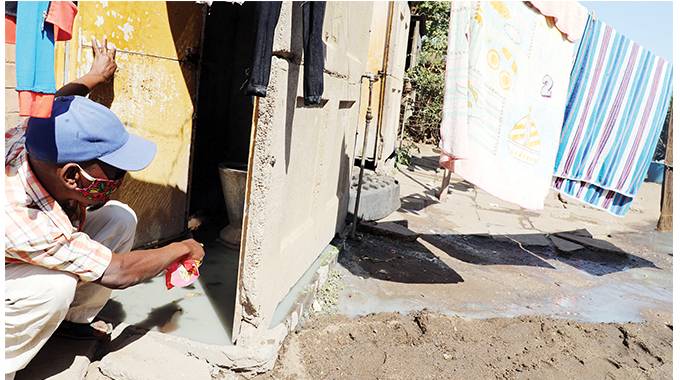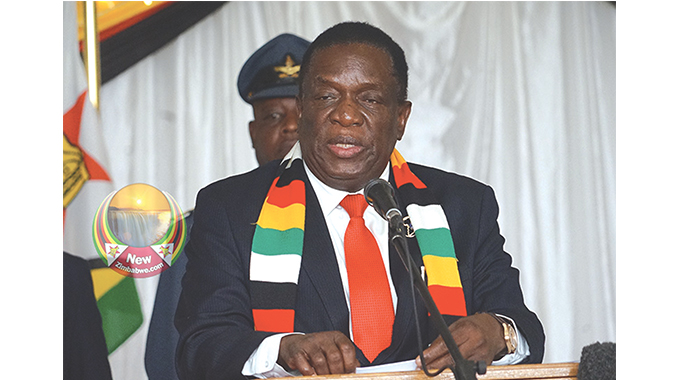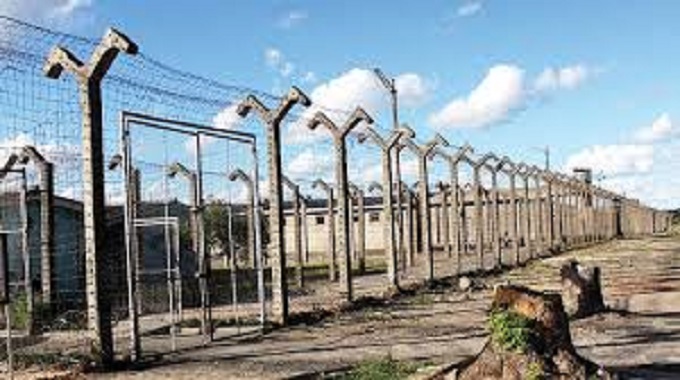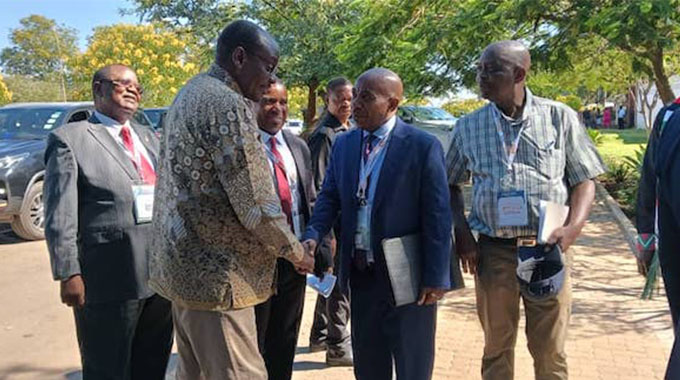Health time bomb as sewage flows in suburbs

Mashudu Netsianda, Senior Reporter
A HEALTH hazard is looming in some of Bulawayo’s suburbs as sewage is flowing in homes and on the streets, at a time when the city has already recorded 13 deaths following a diarrhoea outbreak in Luveve and surrounding areas.
Residents are accusing Bulawayo City Council (BCC) of neglecting its duties which could result in the outbreak of water-borne diseases such cholera and typhoid. Thirteen people including two senior citizens from Entembeni Old People’s Home have died following a diarrhoea outbreak in Luveve and surrounding suburbs in May.
Government attributed the outbreak to Bulawayo’s 144-hour water shedding exercise and vandalism of sewerage pipes.
Residents who spoke to Chronicle said some burst sewerage pipes have gone for over four years without being attended to.

Sewage flows from a toilet at a house in Makokoba suburb
Chronicle news crew visited Makokoba, Matshobana, Mabuthweni, Entumbane and Emakhandeni and observed that some of the pipes were spewing effluent into houses.
In interviews, disgruntled residents said they are now living in fear of an outbreak of diseases, especially in the wake of Covid-19.
“We have been with this problem of sewer pipe bursts for years and even if council comes and attends to it, the following day the situation will be the same. I think BCC workers are tired of attending to this problem because when we report they take months to come,” said Mrs Joice Khumalo of Emakhandeni said.
“It is now our responsibility to clean human waste at our toilets on a daily basis. This is now our everyday life which we have now adopted for years.”
Mrs Ever Siyalunu weighed in: “You were lucky that you came when there is no water in our suburb due to water shedding. Sewer flows into our houses and our yards have turned into streams such that we are now using the bush to relief ourselves.”

Sewage spills out of a manhole in Matshobana suburb
Ms Ntombizodwa Masuku of Mabuthweni said they are now forced to bath in bedrooms because of effluent in the toilets and bathrooms.
“We are sitting on a health time bomb and maybe council wants to act when they start to see people dying of water-borne diseases. Already there is Covid-19 yet the local authority is not prioritising the issues of sewer pipe bursts,” she said.
“If this problem is not addressed, we are going to contract diseases such as typhoid and cholera as the sewer bursts expose us to diseases.”
Ms Sibongile Tshuma of Matshobana said children were the most vulnerable as they are exposed to diseases while playing in sewer ponds.
“Everywhere its sewer flowing and children are seen playing all over the place barefooted, oblivious of the dangers of contracting diseases. At my house, I have actually created a hole on the precast wall to allow effluent to flow out of the yard into the streets,” she said.
Mr Asa Dube of Entumbane suburb said all the effluent from other houses in his neighbourhood gets into his house by virtue of its geographical location.

A boy stands near flowing sewage in Sizinda suburb
“We are forced to use bare hands to get rid of sewer and council is not providing us with protective clothing or even chemicals so that we deal with this terrible stench. We are subjected to inhuman conditions and even when eating you find a fly landing on your food,” he said.
Ms Gladys Dube of Makokoba said the ongoing water shedding exercise in the city has tremendously helped them as it reduces the number of days they have problems with waste water flowing in their yard.
“While other people despair when there is no water, some of us actually celebrate because it means they won’t be any flow of human waste. We use buckets to relive ourselves and dispose of the waste in the bush,” she said.
The Bulawayo Progressive Residents Association (BPRA) co-ordinator Mr Emmanuel Ndlovu urged residents to report the problem to his association so that it can take it up with council officials.
He said there is need for BCC to channel funds towards the maintenance of the sewer system as the number of pipe bursts around Bulawayo continue to increase.
“Over the years residents have voiced the need for the revamp of the sewer system by the local authority, but this has been ignored. Most sewer lines across the city are now old and are now susceptible to constant bursts,” he said.
Mr Ndlovu said council should also take into consideration that the sewer system can no longer cope with Bulawayo’s increasing population.
“For now, BCC seems to be reactive to sewer bursts only while what the city needs is a revamp of the sewer system. A recent example is the revamp of water and sewer pipes at Luveve after a typhoid outbreak in the area,” he said.
“The motto for the local authority is Masiyephambili which means let’s go forward but how are we going to move forward as a city if we are only being reactive to issues as they come rather than looking ahead and improving service delivery in the city.”
According to the latest council minutes, BCC director of engineering services Engineer Simela Dube attributed sewer pipe bursts to blockages and water shedding.
He said although council is committed to reducing all sewer jobs backlog, the main challenge revolves around vandalism of manhole covers by residents, manpower and fuel shortages.
“Fuel shortages caused increase in backlogs of all sewer jobs as well as shortage of materials and equipment such as protective gear and breathing apparatus. Water shedding is causing blockages resulting in the sewer system not flowing as required and subsequently bursts,” he said.
“There was a general increase in reactive maintenance backlog in June 2020 compared to May 2020 due to the re-introduction of other services that were stopped during the intensive lockdown such as sewer connections.”











Comments